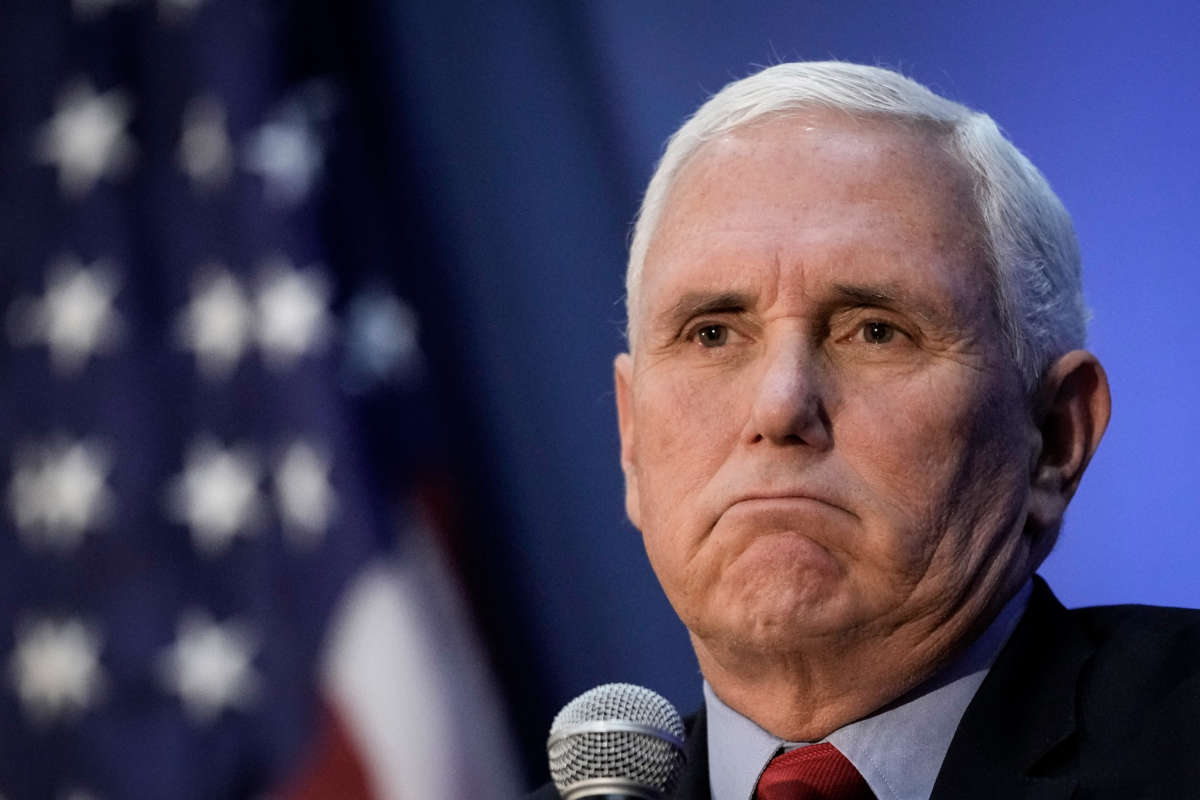Truthout is an indispensable resource for activists, movement leaders and workers everywhere. Please make this work possible with a quick donation.
The chair of the House select committee investigating the January 6 attack on the U.S. Capitol building wants former Vice President Mike Pence to testify before the panel — and hinted that the testimonies from members of Trump’s inner circle could be aired on prime-time television later this year.
Prior to the Capitol attack, former President Donald Trump pushed for Pence to do “the right thing” by disregarding the 2020 election results and refusing to certify the Electoral College. Rep. Bennie Thompson (D-Mississippi), the chair of the January 6 commission, used similar language on Tuesday while urging Pence to testify.
“I would hope that he would do the right thing and come forward and voluntarily talk to the committee,” Thompson said in an interview with CNN.
Thompson added that the commission has not yet “formally asked” Pence to testify. “But if he offered, we’d gladly accept,” he said.
Notably, dozens of Trump loyalists called for Pence to be hung after they broke into the Capitol.
“His life was at risk,” Thompson went on. “There were people who had gallows erected on the lawn of the Capitol ostensibly to hang the vice president. There were people on them threatening the life of the vice president. The vice president could not leave the Capitol of the United States because of the riot. He was sequestered in an area in the Capitol. So his life was in danger.”
Thompson also said that it was important to get Pence’s insight on why Trump waited more than three hours before telling his loyalists to “stop and go home because my vice president is in the building and his life is in danger,” adding that it was an “absolute shame” that Trump didn’t say something sooner.
In a separate interview published by Bloomberg on Tuesday, Thompson said that it was important for future commission hearings to be more public — and hinted at airing them on television during prime-time hours.
“The public needs to know, needs to hear from people under oath about what led up to January 6, and to some degree, what has continued after January 6,” Thompson said.
Although the majority of the select committee’s work is being done in the evening, most of their public hearings are being broadcast during daytime hours. By airing interviews with witnesses and sharing evidence during later hours, the commission might garner more interest in its work from the American public.
“The Select Committee views upcoming hearings as one of its most important opportunities to lay out facts and provide answers to the American people about the January 6 attack and its causes,” an aide from the committee said. “Across a series of hearings, we want to tell a story, start to finish, reaching as many people as we can.”
The hearings haven’t been scheduled yet, but may begin around March or April, Thompson said.
The decision to air the hearings on prime-time television would likely be challenged by Republican members of Congress, especially those with deep loyalties to Trump. But the move could also dispel misinformation by giving Americans a more accurate understanding of the Capitol attack, shining light on Trump’s incitement of his loyalists, his administration’s attempts to overturn the election results, and his refusal to take action as hundreds of people were being injured inside the building.
Holding Trump accountable for his illegal war on Iran
The devastating American and Israeli attacks have killed hundreds of Iranians, and the death toll continues to rise.
As independent media, what we do next matters a lot. It’s up to us to report the truth, demand accountability, and reckon with the consequences of U.S. militarism at this cataclysmic historical moment.
Trump may be an authoritarian, but he is not entirely invulnerable, nor are the elected officials who have given him pass after pass. We cannot let him believe for a second longer that he can get away with something this wildly illegal or recklessly dangerous without accountability.
We ask for your support as we carry out our media resistance to unchecked militarism. Please make a tax-deductible one-time or monthly donation to Truthout.
